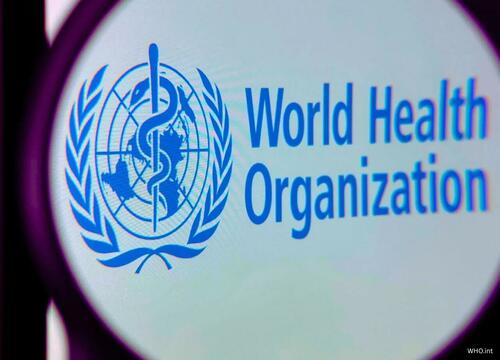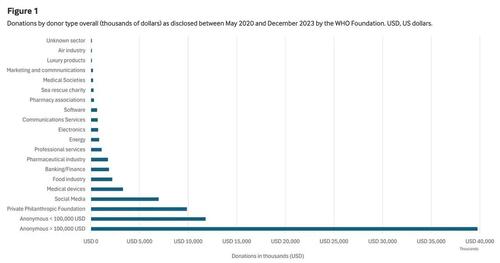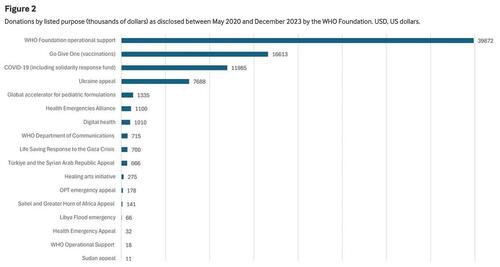A new BMJ Global Health study has confirmed that the World Health Organization’s (WHO) private fundraising arm—the WHO Foundation—has received tens of millions of dollars from pharmaceutical giants, Big Tech companies, and anonymous sources, with nearly half the funding now untraceable.

The study findings come after U.S. Health Secretary Robert F. Kennedy Jr. announced the United States will reject the WHO’s sweeping emergency powers treaty, warning that the same unelected body now seeking “global medical surveillance of every human being.”
The BMJ Global Health study, published Wednesday, reads:
“From its launch until the end of 2023, the foundation disclosed total donation receipts of US$82 783 930 overall, of which US$39 757 326 (48.0%) was from anonymous donations over US$100 000. In total, US$51 554 203 (62.3%) in anonymous donations were reported.”
The top-named donor was the Bill & Melinda Gates Foundation, long considered one of WHO’s most influential funders:
“Donations varied by sector, with the largest named donations coming from the private philanthropic sector, including the Gates foundation and other family foundations, followed by social media companies, medical device companies and the banking/finance and pharmaceutical sectors.”
Secretary Kennedy recently cut off U.S. funding to Bill Gates’ vaccine syndicate Gavi, citing peer-reviewed evidence that the DTP shot it promotes “may kill more children from other causes than it saves,” and condemning the alliance for treating vaccine safety as a PR problem instead of a public health priority.

Moreover, a Gates Foundation–funded trial injected South African children with live tuberculosis-causing bacteria, infecting 260 kids and causing serious harm—all while excluding early post-vaccine infections from analysis and following a prior Gates-funded gain-of-function experiment that engineered TB to grow unchecked.
The WHO Foundation (WHOF), launched in 2020 to accept donations from entities the WHO cannot receive money from directly, now also counts Meta (Facebook), TikTok, Maybelline, Sanofi, Boehringer Ingelheim, and Novo Nordisk among its known funders:
“This included the announcement of a US$50 million commitment from the WHOF via contributions from Sanofi, Boehringer Ingelheim, Novo Nordisk, TikTok, Maybelline and a range of other partners.”
A majority of funds aren’t even going to WHO programs—they’re going to the WHO Foundation’s own operational costs:
“The largest overall category, by amount donated, was ‘WHO Foundation Operational Support’, which received just under US$40 million over the entire reporting period, representing a majority (approximately 56%) of all funding received by the Foundation to date.”

Even more concerning is the Foundation’s sharp drop in transparency, with its public reporting now rated as poor as controversial “dark money” think tanks.
“In the first year of its operation… the WHOF would be rated ‘B’ for transparency… However, in the next two reporting periods, the WHOF would be assessed a ‘D’ for transparency…”
“Nearly 80% of funds donated in January–December 2023 were from anonymous sources and in amounts of over US$100 000.”
“Results show low and declining levels of transparency over time, potentially raising concerns about the level of outside influence and role of commercial interests in setting WHO priorities.”
Though the Foundation claims to avoid tobacco and firearms money, the same is not true for fossil fuel, alcohol, sugar, or vaping interests:
“The current version of the WHOF gift policy sets out specific donor exclusions, yet only for tobacco and firearms manufacturers, while fossil fuel companies, alcohol producers, sugar sweetened beverage manufacturers and vaping companies, for example, are not mentioned in any form.”
The Foundation even publicly advertises insider access to WHO:
“Through its unparalleled access to WHO, the Foundation advances health equity by connecting and collaborating with visionary corporate partners to co-create solutions that have the highest impact.”
The authors of the BMJ Global Health study—affiliated with the U.K.’s London School of Hygiene and Tropical Medicine and University of Edinburgh—warn:
“This analysis of WHOF donor disclosures indicates levels of donor transparency akin to oft-criticised free market think tanks, with attendant risks for both undue influence and/or reputational damage for the WHOF, and by extension the WHO.”
In the end, the WHO’s private fundraising arm isn’t just taking cash from Big Pharma and Big Tech—it’s running on a flood of untraceable money, shielding its true backers behind a wall of anonymity while claiming “unparalleled access” to global health power.
How can the WHO claim neutrality when it’s bankrolled by pharmaceutical giants, Big Tech firms under scrutiny for censorship, and tens of millions in dark money from anonymous sources?
Loading recommendations…


